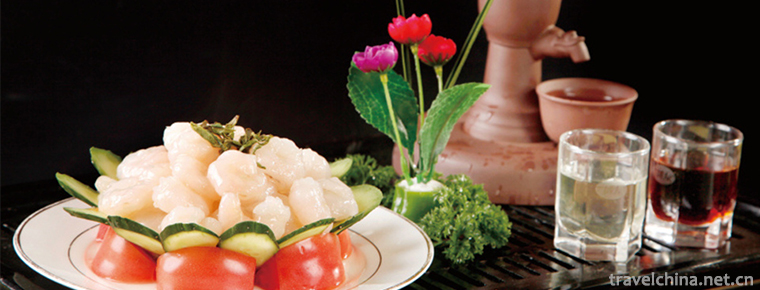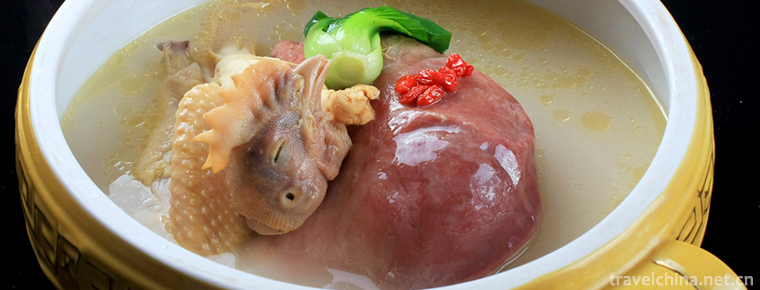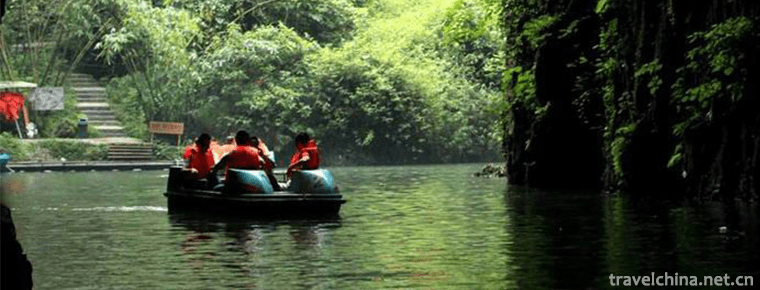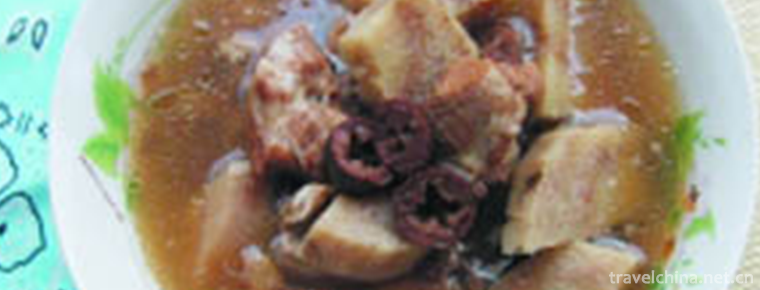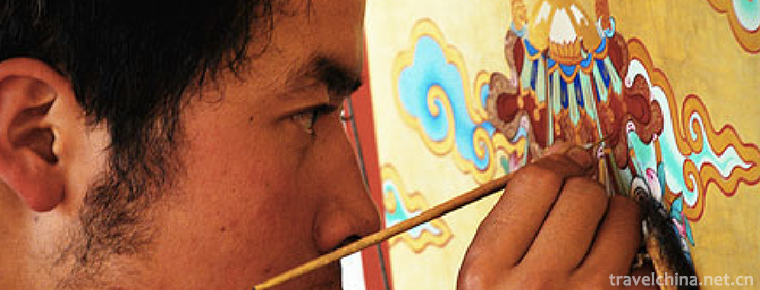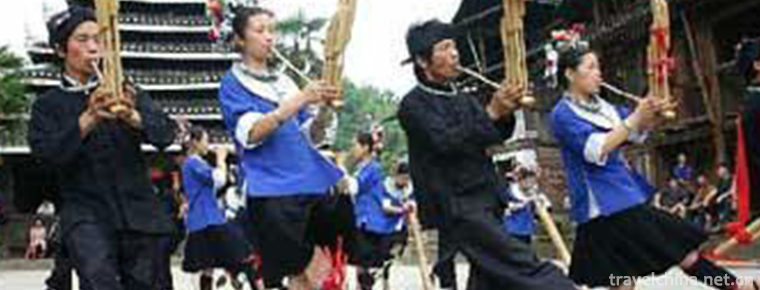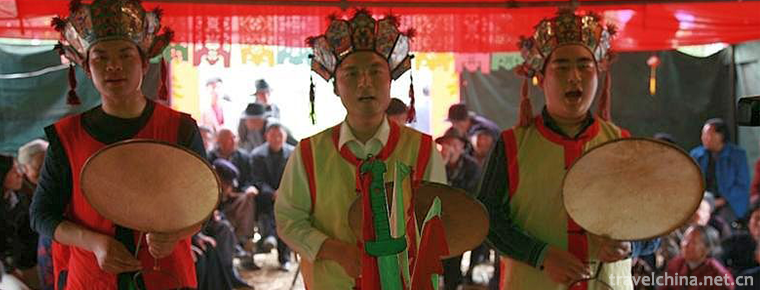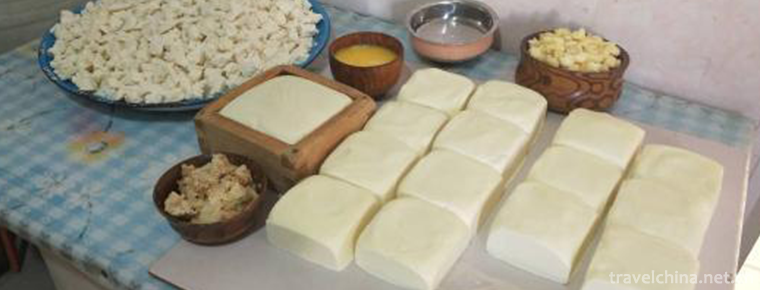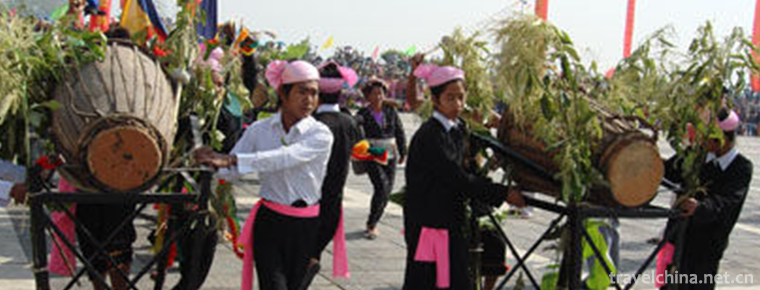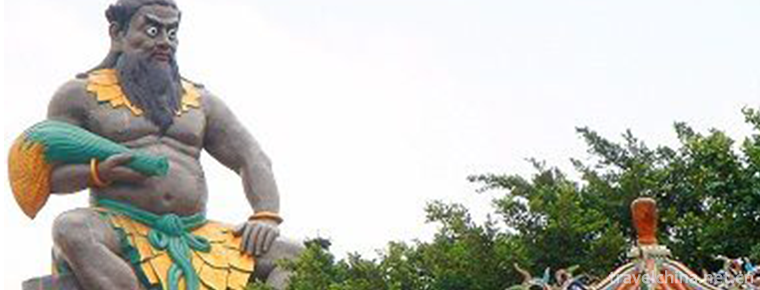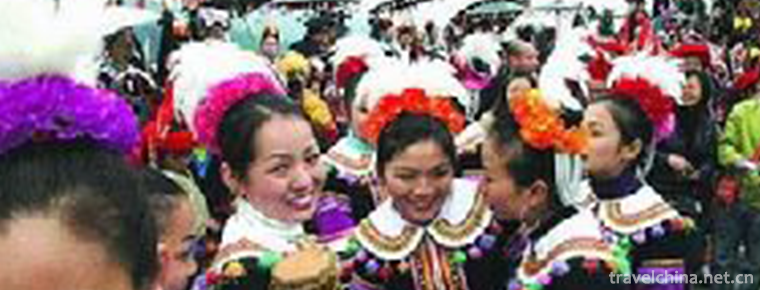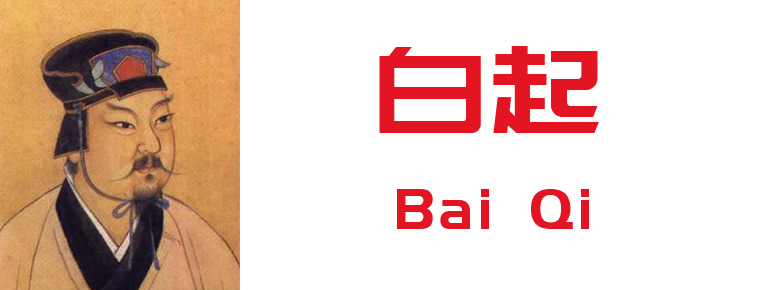Hua Chao Opera
Hua Chao Opera
Huachao Opera, a local traditional drama in Zijin County, Guangdong Province, is one of the national intangible cultural heritage.
Huachao Opera originated from the sacrificial ceremony of "God Dynasty" in Zijin County. It was sung in Hakka dialect and was popular in the eastern Hakka area of Guangdong Province. Since Ming and Qing Dynasties, the music and dance of "Shen Chao" in Zijin County have been deeply loved by villagers. Later, in order to please the audience, artists in the Shen Dynasty often sang anecdotes after the ceremony. Huachao Opera is an organic combination of folk music language and folk literature language. Its singing tone is simple and healthy, popular and easy to sing lyrics and Tao Bai often use humorous and meaningful puns and allegorical sayings. The vivid and vivid language truly reflects the joys and sorrows, ideal pursuit and spiritual individuality of the Hakka people in Zijin County.
On May 20, 2006, Huachao Opera was selected by the State Council of the People's Republic of China as the first batch of national intangible cultural heritage lists, with the number of heritage being IV-75.
historical origin
origin
At the end of Ming Dynasty and the beginning of Qing Dynasty, epidemics prevailed in Zijinshan Mountains. In order to dispel evil spirits, temples and gods were set up everywhere in the countryside. Some folk sorcerers joined the Sanwujie Class to perform sacrificial activities. One sorcerer took a gong and dressed as a monk (flying tiger general), the other as a female dan, with a horn or a bell sword in one hand, a handkerchief in the other hand, while singing and dancing to invite God to send the general to keep peace. Move form, people call "god dynasty". Because the music singing is quite pleasant and the performance is light and graceful, it is very popular with the audience.
Development
At the end of Guangxu period, Ye Chunlin, a wizard, compiled some folk stories according to Hakka local customs and habits, and drew accomplishments from folk songs minor tunes, enriched the singing tune, and performed after the sacrifice of "Shenchao", which was welcomed by the masses. From then on, it gradually absorbed some things of folk art and sister operas to enrich the performance and develop into a flower-dynasty opera with its own unique style. Therefore, Ye Chunlin's singing troupe is the first Huachao Opera troupe in Zijin County (formerly Yongan County).
On the eve of the founding of New China, Huachao Opera was devastated by reactionaries. Some Huachao Opera troupes were banned from performing satirical plays on landlords and government offices, and artists were arrested and imprisoned. Some Huachao Opera troupes were poisoned and used by landlords and gentry, making them yellow and obscene and serving them in casinos. Villagers were not allowed to see them. Artists were cursed as "the ninth class" and their social status was very low. As a result, they changed their professions one after another. The flower of Huachao Opera almost disappeared. After the founding of New China, under the guidance of the Party's literary and artistic principles, Huachao Opera gained new life again. In 1956, according to Huachao traditional dance, singing and sorting out "Eighty Old Men Dancing the Flower Dynasty" (Song and Dance), it reflected the new atmosphere in the countryside after land reform and co-operation, and won high praise in Shantou Special Zone and Guangdong amateur mass art performances, and was processed by South China Song and Dance Troupe. Later, he took him to Beijing to attend the National Amateur Arts Festival. Since then, the Huachao Opera has received extensive attention. In the same year, the Huachao Art Research Group of Zijin County was established, and a tour performance team was organized. Established in 1959, the Huachao Brushing Group of Zijin County in Shantou District excavated and sorted out more than 20 traditional Huachao dramas, created more than 80 single-act and multi-act Huachao dramas in modern and ancient costumes, and participated in four performances in Guangdong Province.
Cultural characteristics
Performance program
Huachao Opera performance program originates from labor production. From life, it extracts a set of beautiful, fast-wheeled and life-rich performance programs, such as going up hills, wading downhills, crossing bridges, milling rice, grinding, spinning cotton, weaving hemp, flower picking, fruit picking, load-bearing, laundry and so on. Its performance techniques, steps and stature are different from other operas. For example, relatively fixed heart and feet, little steps, heart-piercing hands and fans, rolling towels, round hands, flower picking, turning steps and so on all have their own unique artistic style, simple and rough movements.
Aria music
The singing music of Huachao Opera is mainly composed of Shenchao Opera and folk minor, sometimes using Hakka folk songs. The tune of the God Dynasty originates from the tune sung by the God dynasty's sacrificial practices of witches. The lyrics are irregular long and short sentences, often connected with village words such as "where", "mile", "ah", "yo". The main modes of the tune sentences are Yu mode and Yu mode. Shenchao tune is generally slow in rhythm and sad in mood. It is often used in Lyric arias. The traditional singing feature of Shenchao Opera is that one person leads the singing and all people help the singing. Singing and reading are combined freely and flexibly. In the process of singing, Shenchao tune also absorbs and integrates many factors of local folk songs, changing the original mood of sacrificial music, so it has the characteristics of dramatic music.
Accompaniment instrument
Accompanied Orchestra and plucked instruments mainly include Gaohu, Erhu, Yangqin, Kun, Jane Zi, spray sonar, pen, clarinet, Cello and so on; percussion instruments mainly include plate drum, fish, tanggu, Gaobian gong, Gong and so on.
Representative repertoire
Huachao Opera has rich traditional repertoires, including "Autumn Flower Collection", "Grocery Sale", "Three Officials into the House", "Transition", "Sudan", "Ziyunyin", "Red Stone Ridge", "New Biography of Iron Rooster", "Delivery of Vegetables", "Encountering the Back Store" and so on.
Inheritance and protection
Inheritance value
Huachao Opera is a unique and rare opera in China, which carries the humanistic thought of Hakka people's cultivation, reading, heirloom and religion. Huachao Opera has irreplaceable historical and cultural value in discussing folk literature, folk music, folk culture and religious culture.
The traditional themes of Huachao Opera are mostly derived from folklore, which advocates the positive themes of punishing evil and promoting good, loyalty and patriotism, and freedom of marriage. The Confucianism advocated by the Hakka people and the humanistic concepts of cultivating, reading, heirlooming and emphasizing culture and religion are fully displayed in Huachao Opera. Therefore, Huachao Opera has high academic research value in folk literature, folk music, folk culture and religious culture.
Inheritance status
Under the impact of modern civilization, Huachao Opera is facing unprecedented pressures and challenges such as the gradual loss of audiences, serious loss of professionals, inadequate development of the drama itself and lack of necessary economic support.
Inheriting characters
Zhong Shijin, male, born in 1943 in Heyuan City, Guangdong Province. The third batch of national intangible cultural heritage projects are representative successors of Huachao Opera.
protective measures
As a local drama that has been paid attention to, it has become a national intangible cultural heritage since 2006. In order to protect this kind of Hakka intangible cultural heritage, the Cultural Department of Zijin County has formulated a five-year protection plan, which protects it from both dynamic and static aspects. Specifically, it includes: carrying out the census of Huachao Opera in an all-round way, collecting historical materials of Huachao Opera, and making full use of the forms of words, pictures, sound recordings, video recordings and other digital technologies to organize and establish systematic archives; giving full play to the role of Huachao Opera Art Research Laboratory, employing veteran experts and artists to carry out in-depth research on Huachao Opera; and conducting special census and research results of Huachao Opera through sorship and classification. Publishing books and videos; establishing eight ecological protection villages of Huachao Opera, such as lifting cars, Tugui, partridges, Longwo, Shentian, Likeng, guns and boarding cars; taking the form of sending operas to the countryside and performing free of charge in schools; and setting up training courses for students of Huachao Opera on holidays to cultivate teenagers'interest in Huachao Opera and cultivate successor talents.
social influence
social activities
In 1963, during the performance of the Huachao opera Sudan in Guangzhou, the main actor was cordially received by Premier Zhou Enlai.
In 1988, Cao Yu, then chairman of the Chinese Dramatists Association, presented the title of "Camellia in the Valley" for Huachao Opera.
Important performance
From December 9 to 11, 2011, with the support of Zijinshan Culture Promotion Association of Shenzhen City and local and overseas scholars, the traditional Huachao opera Shuanghua Yuan was performed in Futian and Longgang of Shenzhen.

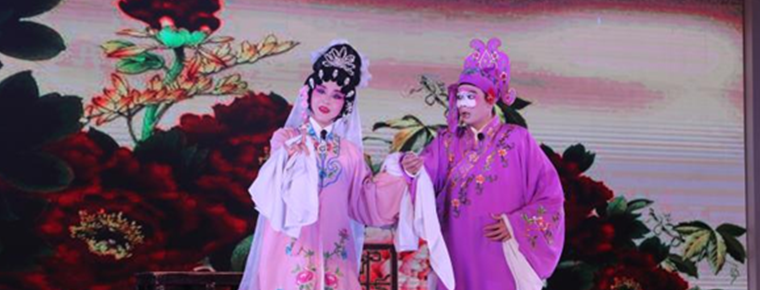
Hua Chao Opera
-
Stirfried Shrimps with Longjing Tea Leaves
Lobwell shrimp is a famous Hangzhou dish with a strong local flavor. It is made of lobwell tea and shrimp before and after the Qingming Festival.
Views: 212 Time 2018-10-27 -
Pork stomach stewed chicken
Belly chicken is a very traditional dish in Hakka area. It has a long history. It was first eaten by Hakka women when they were sitting on the moon, and it had a very good nourishing effect.
Views: 272 Time 2018-11-02 -
Shimen Xianhu Scenic Area
Shimen Xianhu Scenic Area is the first national 3A-level tourist scenic spot in Rongan County, located in Liuzhou, Guangxi. It has high Gorges out of Pinghu Lake
Views: 133 Time 2019-02-08 -
Eight claw Fish Powder Pueraria Decoction
500 grams of Pueraria Thunb, 50 grams of octopus, 400 grams of pork legs, four candied dates, and 1/6 peel.
Views: 157 Time 2019-03-27 -
Tibetan Thangka
Tibetan Thangka, also known as Tangga, is a transliteration of Tibetan language. It is a scroll painting mounted on satin fabrics. It is a kind of painting with Tibetan cultural characteristics
Views: 173 Time 2019-04-15 -
Dong year
In Dong year, Dong language is called Ninggan, also known as Winter Festival or Yang Festival. Winter Festival was originally a festival of Yang surname of Dong nationality.
Views: 360 Time 2019-04-27 -
End drum cavity
Weishan Lake Drum Tune, also known as Duangong Tune, is a traditional folk art of the Han nationality originating in Weishan County and Dongping County of Shandong Province
Views: 230 Time 2019-04-28 -
Dairy Products Production Techniques
Mongolian phonetic translation. Mongolian drinks. Also known as "white food", that is, dairy products. Milk, mare's milk, goat's milk, camel's milk, cream of milk skin, cheese, dried milk, s
Views: 153 Time 2019-06-07 -
Water Encouragement
Water drum dance is a kind of popular dance spread between the De'ang and Miao nationalities. It combines water, drum and dance to worship ancestors, pray for good weather and peace in villages. Howev
Views: 154 Time 2019-06-15 -
Legend of Emperor Yan Shennong
Yan Emperor Shennong, one of the three emperors and five emperors, is one of the local folklores in Suizhou, Hubei Province, and is the national intangible cultural heritage. After Wa Fuxi, a stepdaug
Views: 221 Time 2019-07-10 -
Yao Peoples Playing Hall
The Playing Hall is a folk grand gathering of memorizing ancestors, recalling history, celebrating harvest, rewarding vows, disseminating knowledge and mass entertainment activities in Liannan Paiyao.
Views: 308 Time 2019-07-11 -
Bai Qi
White(Bai Qi)(? - 257 BC). He is a man in the village of Bai village, Chang Xing Town, Mei County, Shaanxi today. Outstanding military strategist and representative of "military strategist"
Views: 146 Time 2019-09-11
